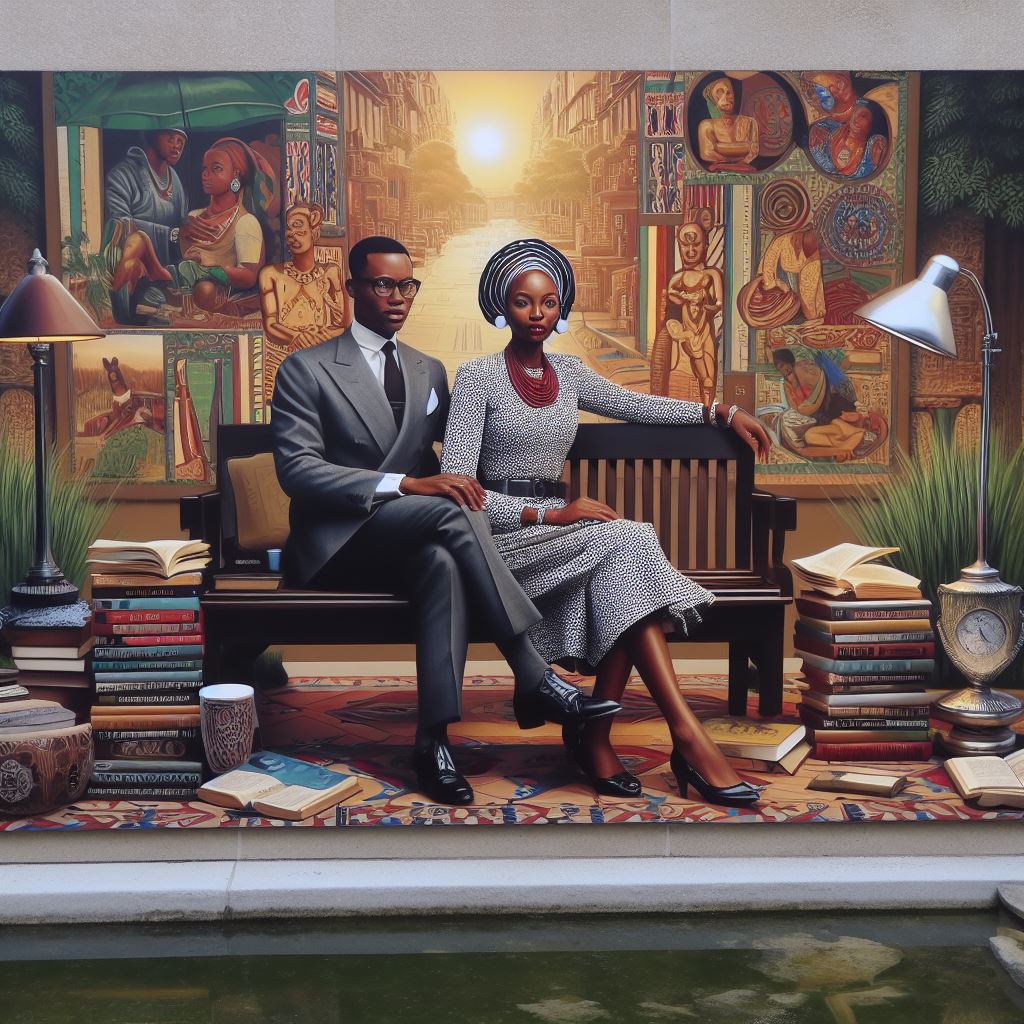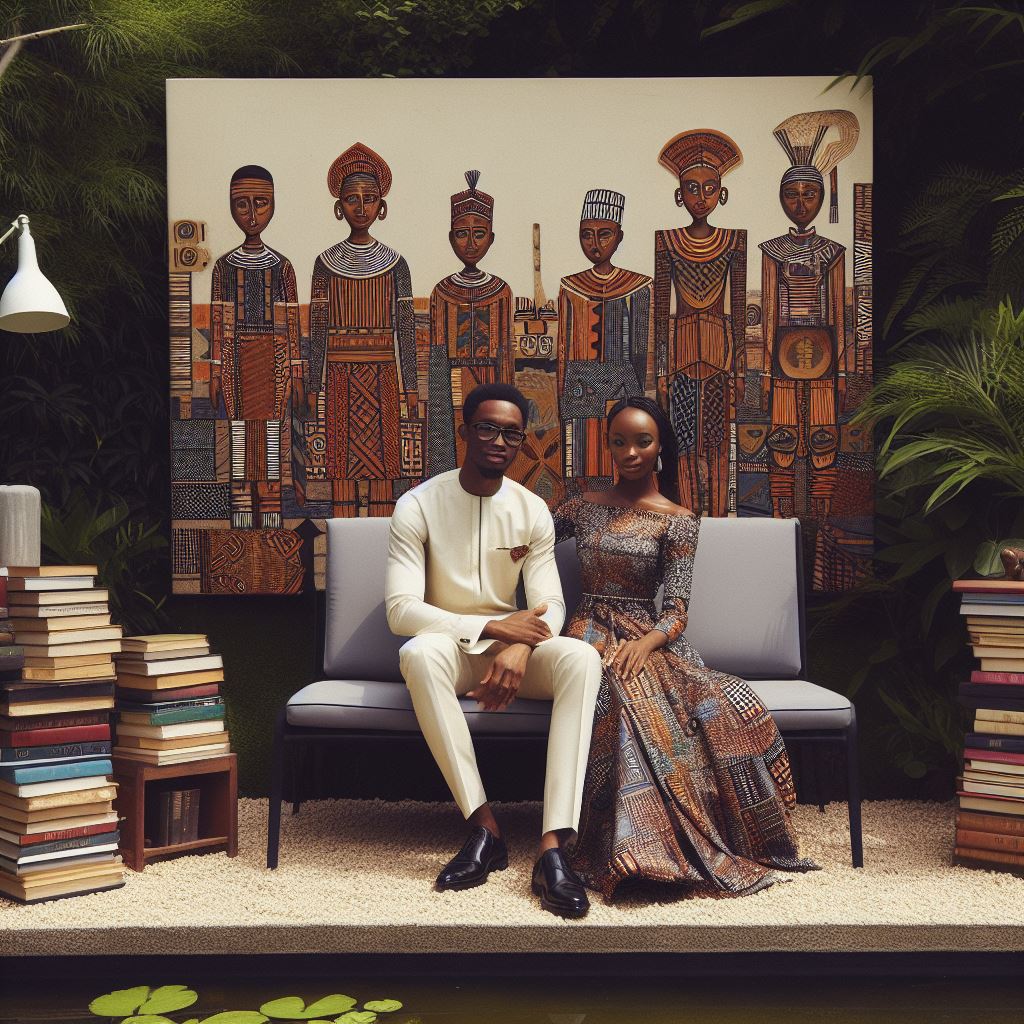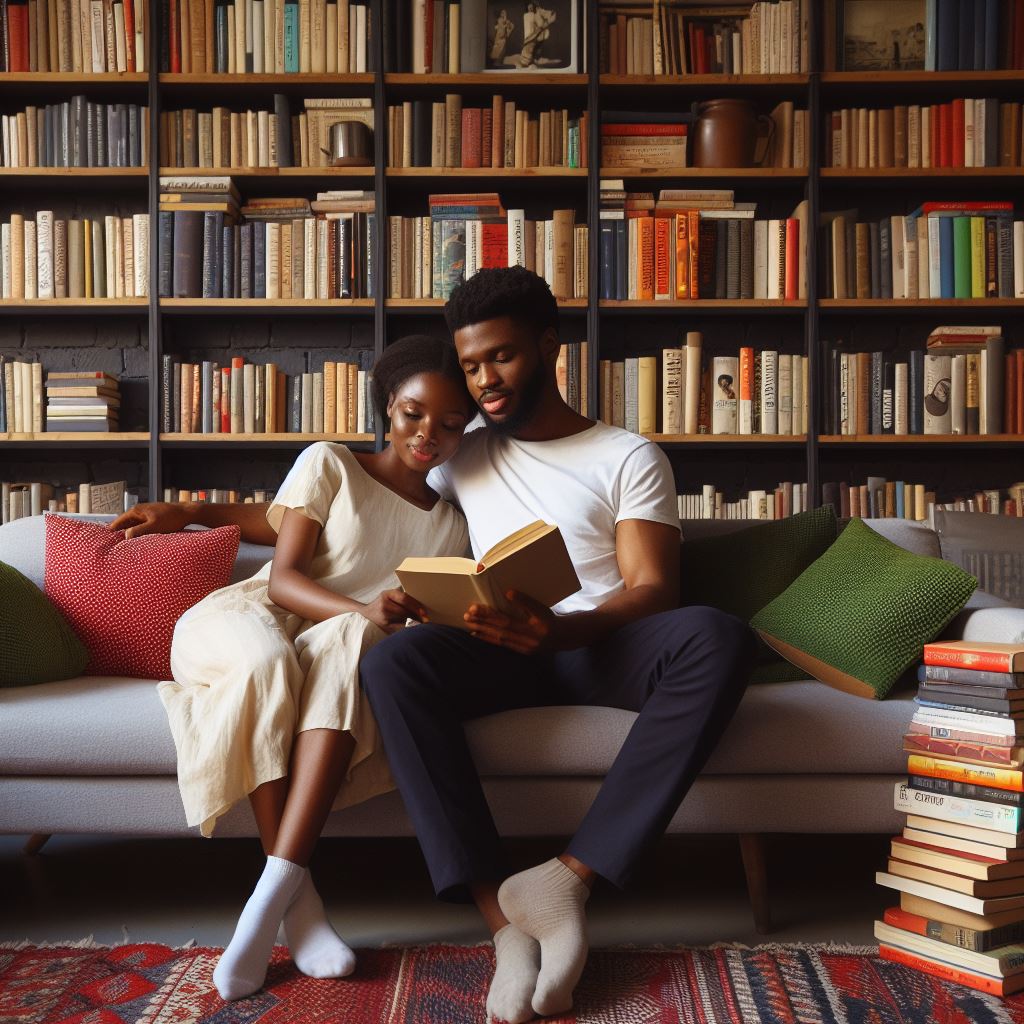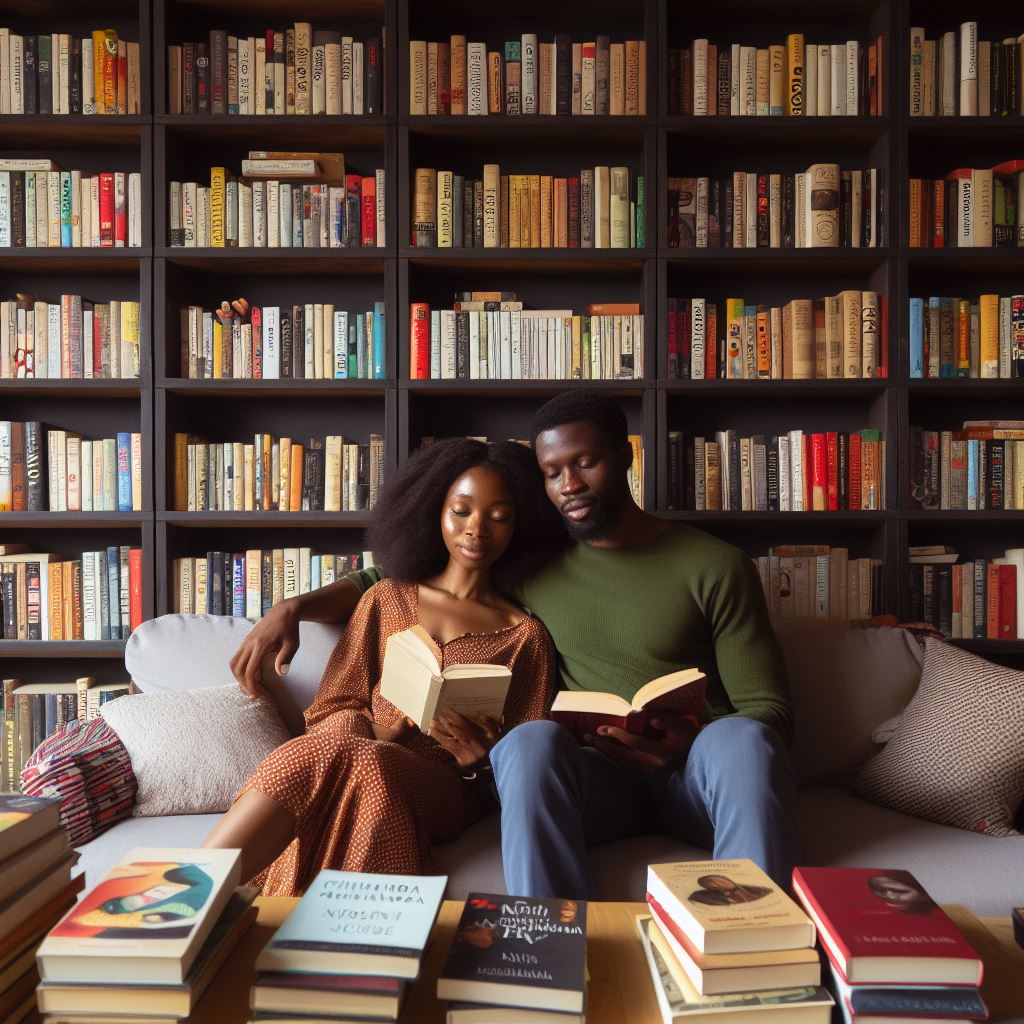Introduction
A. Modern Nigerian Literature
Modern Nigerian literature stands at the crossroads of tradition and transformation, weaving narratives that challenge societal norms.
B. Definition of Marriage
In traditional Nigerian society, marriage was often perceived through a traditional lens, emphasizing customs, family alliances, and social expectations.
C. Significance of Rethinking Marriage
- Evolving Roles: Modern literature redefines marital roles, reflecting the changing dynamics between partners.
- Gender Equality: Narratives question traditional gender roles, advocating for equality within marital relationships.
- Social Pressures: Authors delve into the societal pressures individuals face, challenging the concept of ‘ideal’ marriages.
- Cultural Reflection: Literature portrays the clash between cultural expectations and individual aspirations, reshaping perceptions of marital unions.
- Impact on Society: Rethinking marriage in literature catalyzes discussions, fostering progressive attitudes in Nigerian society.
In this section, we explore how modern Nigerian literature intricately dissects the institution of marriage, offering fresh perspectives and shaping societal dialogues.
Historical Context of Marriage in Nigeria
A. Traditional Nigerian marriage customs and practices
- Marriage in Nigeria has deep roots in the customs and traditions of various ethnic groups.
- It is often seen as a union not just between two individuals but also between families.
- Traditional marriage ceremonies are often elaborate and involve various rituals and ceremonies.
- These ceremonies showcase the rich cultural heritage of Nigeria and reinforce community bonds.
- Dowry payment is a common practice, symbolizing the groom’s readiness to take on the responsibilities of marriage.
- Polygamy was also an accepted practice in many Nigerian cultures, providing a sense of social status.
B. Role of arranged marriages in the past
- Arranged marriages were prevalent in Nigeria, particularly in certain cultural and religious communities.
- These marriages were primarily based on the compatibility of families and societal considerations.
- Parents and elders played a significant role in arranging marriages, ensuring compatibility and stability.
- Arranged marriages were seen as a way to strengthen social ties and preserve cultural traditions.
- However, individual desires and preferences were often overlooked in the process.
C. Influence of colonialism on Nigerian marriage
- The arrival of colonial powers in Nigeria brought significant changes to the institution of marriage.
- Colonial administrators introduced Western concepts of marriage, such as monogamy and legal regulations.
- Christian missionaries played a crucial role in promoting Christian marriage ceremonies and monogamy.
- These influences led to a decline in polygamous marriages and traditional practices.
- Western notions of romantic love and personal fulfillment began to influence marital expectations.
- The economic and political changes brought by colonialism also impacted marriage dynamics.
- Education and employment opportunities outside traditional gender roles influenced partner choices.
- Women gained more independence and agency, challenging traditional gender roles within marriages.
In exploring the historical context of marriage in Nigeria, it becomes evident that modern Nigerian literature reflects the changing dynamics of this institution.
From traditional customs and practices to the influence of arranged marriages and colonialism, the evolution of marriage in Nigeria has shaped contemporary narratives on the topic.
The next section will delve into the ways modern Nigerian literature rethinks marriage through the portrayal of various characters and their experiences.
Read: Dissolution of Marriage by Ordinance: Rights & Responsibilities
Transition in Modern Nigerian Literature
A. Shift from traditional marriage narratives to more complex portrayals
- Modern Nigerian literature has challenged the traditional portrayal of marriages in Nigerian society.
- Authors no longer present marriage as a perfect institution, but instead explore its complexities.
- They depict marriages as multidimensional relationships, showing the struggles and conflicts that arise within.
- Marriages are no longer idealized but presented as flawed, reflecting the realities of Nigerian society.
- Through these more complex portrayals, literature encourages readers to question societal norms surrounding marriage.
B. Exploration of gender roles and power dynamics in marriages
- Modern Nigerian literature also delves into the exploration of gender roles within marriages.
- Authors challenge traditional gender expectations, presenting unconventional characters who break societal norms.
- Women are portrayed as strong and independent individuals, challenging the patriarchal power dynamics in marriages.
- Men are also shown as vulnerable and emotionally complex, moving away from stereotypical gender roles.
- These portrayals prompt readers to reflect on the impact of gender roles and power imbalances on marriages.
C. Depiction of love marriages and their challenges
- Another significant aspect of modern Nigerian literature is the depiction of love marriages.
- Authors explore the challenges and complexities that arise when individuals choose their own partners.
- Love marriages are shown to face societal opposition and cultural clashes, creating tension and conflict.
- These narratives shed light on the clash between individual desires and societal expectations within marriage.
- Readers are encouraged to consider the importance of love and companionship in a successful marriage.
D. Representation of inter-ethnic and interracial marriages
- Modern Nigerian literature also reflects the changing nature of marriages in Nigerian society.
- Authors portray inter-ethnic and interracial marriages, breaking down barriers and challenging traditional boundaries.
- These marriages face unique challenges due to cultural differences and societal prejudices.
- Through these portrayals, literature emphasizes the need for acceptance and understanding in inter-ethnic and interracial relationships.
- By portraying diverse marriages, literature contributes to the ongoing conversation about cultural and racial integration in Nigeria.
In short, modern Nigerian literature has undergone a significant transition in its portrayal of marriages.
Authors now present more complex and realistic narratives, challenging traditional norms and exploring various aspects of marriage.
They delve into gender roles, power dynamics, love marriages, and inter-ethnic/interracial marriages, prompting readers to critically examine societal expectations.
Through these portrayals, Nigerian literature reflects the changing dynamics of its society, advocating for acceptance, understanding, and individual agency in marriages.
Read: Challenges and Triumphs: Stories of Nigerian Married Couples

Reimagining Marriage in Modern Nigerian Literature
A Individuality and personal choice in choosing a partner
Modern Nigerian literature challenges traditional norms by emphasizing the importance of individuality and personal choice in selecting a life partner.
These narratives shine a spotlight on the notion that marriage should not be solely based on societal pressure or family expectations.
Instead, they advocate for the freedom to explore personal desires and find happiness in one’s chosen partner.
In Chimamanda Ngozi Adichie’s acclaimed novel “Americanah,” the protagonist, Ifemelu, rejects societal expectations and parental pressures in her pursuit of love.
She refuses to settle for an arranged marriage and instead embarks on a journey of self-discovery, ultimately choosing to be with the man she truly loves.
This narrative celebrates the power of individual agency and challenges the idea that marriage should be solely driven by societal expectations.
B. Critique of gender inequalities and patriarchal norms in marriages
Modern Nigerian literature also critically examines gender inequalities and patriarchal norms that persist within marriages.
These narratives shed light on the power dynamics and oppressive structures that often overshadow relationships, particularly for women.
By portraying these issues, the literature prompts reflection and dialogue on how to address and combat gender disparities within marital relationships.
In Buchi Emecheta’s novel “The Joys of Motherhood,” the protagonist, Nnu Ego, undergoes immense societal pressure to bear children and fulfill her duties as a wife.
However, she faces numerous hardships and struggles to find her own identity within the confines of traditional gender roles.
This narrative exposes the detrimental effects of patriarchal norms, urging readers to rethink and challenge such inequalities.
C. Portrayal of unconventional and non-traditional marital arrangements
Modern Nigerian literature also explores unconventional and non-traditional marital arrangements, offering alternative perspectives on what constitutes a successful marriage.
These narratives present diverse relationship dynamics that defy conventional norms, encouraging readers to question and reimagine the traditional concept of marriage.
In Lola Shoneyin’s novel “The Secret Lives of Baba Segi’s Wives,” the author explores the complexities of a polygamous marriage.
Through multiple female perspectives, the novel delves into the intricacies and tensions within the household, highlighting the human emotions and conflicts that exist in unconventional relationships.
This portrayal challenges the idea that a successful marriage is solely based on monogamy and prompts a reevaluation of societal expectations.
D. Incorporation of LGBTQ+ relationships and their challenges
Modern Nigerian literature is also breaking new ground by incorporating LGBTQ+ relationships and shedding light on the challenges faced by these marginalized groups within a conservative society.
By highlighting LGBTQ+ experiences, these narratives strive to increase visibility and foster empathy towards individuals whose love and relationships are often dismissed or stigmatized.
A leading example of this is Chinelo Okparanta’s novel “Under the Udala Trees,” which narrates the love story of two young women, Ijeoma and Amina, during the Nigerian civil war.
The novel explores the struggles and sacrifices the characters make to be together in a society that condemns same-sex relationships.
By incorporating LGBTQ+ perspectives, the author challenges the existing norms and fosters conversations about acceptance and inclusivity.
In essence, modern Nigerian literature plays a pivotal role in rethinking and challenging traditional notions of marriage.
By emphasizing individuality and personal choice, critiquing gender inequalities and patriarchal norms, portraying unconventional relationships, and incorporating LGBTQ+ perspectives, these narratives encourage readers to rethink and reimagine the institution of marriage in contemporary Nigerian society.
Through their powerful storytelling, these authors contribute to societal progress and facilitate the exploration of diverse relationship dynamics.
Read: Protecting Assets & Legacies: Ordinance Marriage in Nigeria
Delve into the Subject: Signs Your Nigerian Partner is Ready for a Marriage Proposal
Impact of Modern Nigerian Literature on Society
A. Reflection of changing societal attitudes towards marriage
Modern Nigerian literature plays a crucial role in reflecting the shifting attitudes towards marriage in Nigerian society.
It explores the complexities, challenges, and dynamics of contemporary marriages, providing a mirror to society.
Authors like Chimamanda Ngozi Adichie, with her celebrated novel “Americanah,” delve into the evolving nature of relationships and marriages.
They highlight the changing roles of men and women, the rise of feminism, and the influence of Western ideals in shaping Nigerian marriages.
By depicting the struggles and triumphs of diverse characters in their marital relationships, these literary works contribute to the ongoing conversation about marriage.
B. Role of literature in promoting dialogue and challenging traditional norms
Modern Nigerian literature serves as a powerful tool in promoting dialogue and challenging traditional norms surrounding marriage.
Writers like Buchi Emecheta in “The Joys of Motherhood” tackle issues such as patriarchy, polygamy, and the constraints placed on women within traditional Nigerian marriages.
Through vivid storytelling, these authors expose societal injustices and offer alternative perspectives, initiating crucial debates about the institution of marriage.
Moreover, the inclusion and exploration of LGBTQ+ narratives in modern Nigerian literature further challenge traditional gender norms and heteronormative constructs in marriages.
C. Influence on readers’ perceptions and understanding of marriages
Modern Nigerian literature plays a significant role in shaping readers’ perceptions and understanding of marriages.
Through rich characters and compelling narratives, it humanizes the complexities and nuances of marital relationships, allowing readers to empathize with various perspectives and experiences.
These literary works provide a platform for readers to explore their own beliefs and challenge preconceived notions about marriage.
By presenting diverse marital experiences, from love marriages to arranged marriages, authors like Helon Habila in “Waiting for an Angel” enable readers to broaden their understanding of the institution.
D. Contribution to the ongoing discourse on marriage reform
Modern Nigerian literature contributes significantly to the ongoing discourse on marriage reform within Nigerian society.
Authors present different narratives that shed light on the flaws and limitations of traditional marriages,
urging readers to question existing societal norms and strive for change.
For instance, in Oyinkan Braithwaite’s “My Sister, the Serial Killer,” the protagonist’s desire for freedom and autonomy challenges the notion of marriage as a woman’s ultimate goal.
These literary works act as agents of social change, inspiring individuals to redefine their expectations and demand equality within marriages.
In fact, modern Nigerian literature has a profound impact on society by reflecting changing attitudes towards marriage, promoting dialogue, influencing readers’ perceptions, and contributing to ongoing marriage reform discussions.
These literary works highlight the complexities, challenges, and evolving dynamics of contemporary marriages, ultimately encouraging individuals to question traditional norms and strive for more equitable and fulfilling relationships.
Read: Intercultural Marriages in Nigeria: Bridging Differences
Conclusion
Modern Nigerian literature plays a crucial role in rethinking and reshaping our understanding of marriage.
Through various literary works, authors challenge traditional stereotypes and shed light on the complexities of marital relationships.
The main points discussed include the portrayal of marriage as a source of empowerment for women, the exploration of unconventional relationships, and the examination of societal expectations and pressures on couples.
Modern Nigerian literature highlights the importance of individual happiness and fulfillment within marriages, emphasizing the need for equality, communication, and mutual respect.
It encourages readers to question outdated notions and promotes healthier and more realistic perspectives on marriage.
The significance of this literature cannot be underestimated, as it paves the way for a more inclusive and progressive society.
By challenging existing norms, it creates room for dialogue and offers a platform for marginalized voices to be heard.
Looking ahead, there are potential further explorations in literature that can continue to reshape our understanding of marriage.
Authors may delve deeper into LGBTQ+ relationships, dynamics of polygamous marriages, or the impact of globalization on traditional marital institutions.
In closing, modern Nigerian literature acts as a catalyst for change, urging us to critically examine societal constructs and reconsider our perceptions of marriage.
It is through these literary works that we can ultimately pave the way for a more inclusive and egalitarian society.




